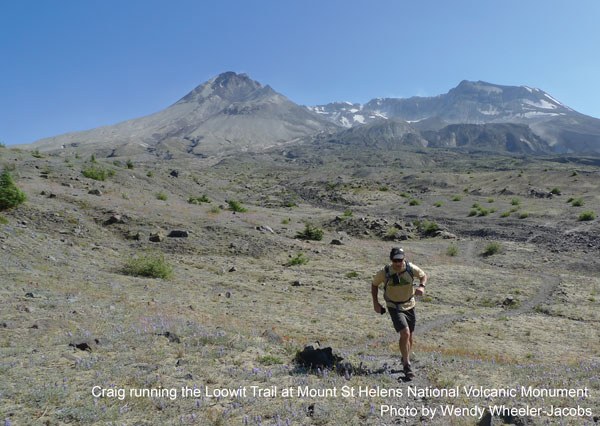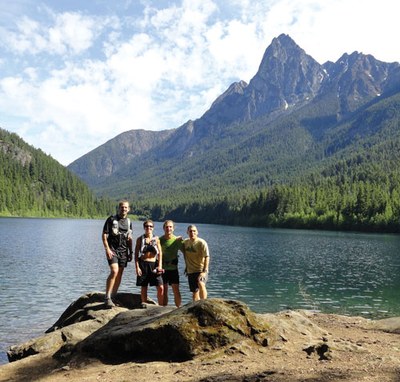
by Craig Romano, Guidebook Author
I vividly remember the first time I encountered runners on a backcountry trail. It was during the summer of 1985 and I was hiking in New Hampshire’s Pemigewasset Wilderness; New England’s largest wilderness area. I was wearing heavy boots and schlepping a pack complete with the 10 essentials-plus. The runners were carrying practically nothing — and their footwear and clothing were minimal too. My initial reactions were, those guys are crazy traveling through the backcounty with not much more than a water bottle — and how dare they breeze through this trail disrupting my wilderness experience!
Well, a lot has changed for me in the past 30 years. Trail running and ultra running has grown exponentially since the 1980s and you’d be hard pressed to hike just about anywhere in the Appalachians, Rockies, Cascades and Sierras and not encounter a trail runner — or pack of them. I've taken up trail running too; venturing into the backcountry and covering ground at speeds and distances I never would have imagined myself capable of back in my nascent hiking days.
I cherish my newfound pursuit of trail and ultra running and my accelerated fitness level that, in my 50s, puts my 20s' level to shame. However, I realize that some folks in the hiking community are a little unwelcoming to those of us who like to travel through the wilderness at fast speeds with light loads. Why? I can guess these folks feel like I did during my initial encounter with trail runners. That traveling fast and light cheapens the backcountry experience. Isn’t it supposed to be hard and take time? Running down a trail somehow cheapens or detracts from a true wilderness experience.
I have even encountered a few hikers on the trail who were incredulous that I covered in one day what took them many. I've gotten looks of disapproval that seem to say I can’t possibly enjoy or see anything when I am traveling through places like the Enchantments in a day. I understand these sentiments. Pioneer guidebook author and Northwest conservationist Harvey Manning was fond of saying, "If you want to make the world bigger, slow down." He detested the intrusions of the modern world on the backcountry and had no tolerance for motorcyclists or mountain bikers on trails.
Harvey probably wouldn’t be too happy with the proliferation of speed or endurance hikers. He was a person that insisted you spend days in places — places that sometimes were just a few miles into the backcountry, and places that can easily and rapidly be reached by trail runners. And the idea of turning the Pacific Crest Trail (which he often referred to as a hiker highway) into an aerobic autobahn — a trail that more and more folks are competing to hike in record time — I imagine he would only welcome with pure disdain. But, should it matter what Harvey, you, me, or that hiker over there thinks about those who want to move about trails at the pace of a sprinting cheetah?
Let’s face it, times are different now and there’s a whole new generation of people taking to the trails these days. Some folks want more than a walk in the wilderness — they love the thrill of challenging themselves at levels they never thought were physically possible. What better place to challenge the human body and psyche than on the trail? The accomplishments of Heather Anderson, Jennifer Phar, Joe McConaughy, and Scott Williamson are truly amazing, and these folks should be congratulated for such stunning physical feats. And each one of them, and those who aspire to be just like them, has their own reasons for doing what they do. But are they getting a wilderness experience? Most would say yes — it’s just not the same wilderness experience that traditional hikers are seeking.
A few years back, I interviewed a Triple-Crown Hiker (someone who has hiked the Pacific Crest Trail (PCT), Appalachian Trail (AT), and Continental Divide Trail — end-to-end). While he wasn’t a record holder, he did cover these long distance trails within remarkable time periods. I asked him about highlights along the way. He never described the mountains, forests, lakes, wildflowers, morning mist, or wildlife he encountered. Instead he waxed about internal things — what it took to keep going and the logistics of how to make it all happen.
From contemplative to competitive
I competed in the White River 50-Mile Endurance Run a few years ago, and it was one of my most challenging runs. I trained hard for it and I successfully completed it and I am proud of that accomplishment. And while the terrain the race course incorporates includes stunning views of Mount Rainier and large tracks of beautiful old-growth forest, the race was indeed more about what was going on internally. I just don’t recall the Mountain that much as I do fighting my demons and pushing my body to where it has never been before. There was some great human bonding on the trail with some of my fellow competitors — but, it wasn't a wilderness experience, nor a transformative journey through nature. Or was it?

I know plenty of trail and ultra runners that absolutely love the wilderness and are proponents for its protection. Wendy Wheeler-Jacobs (who I have had the pleasure of trail running at Mount St Helens with) is the Board President of the Washington Trails Association. Gavin Woody (who I met along with Wendy at the White River 50) is a past president of the Mountaineers. Both are incredible ultra runners and care deeply about our trails and wilderness — and are proponents for their protection.
But could there be harm done to our wilderness areas and trails by allowing and/or promoting ultra trail running events and speed hiking through them? And what about other trail users? Can our pursuit to run as far and hike as fast as we can impede on other’s enjoyment of the backcountry? Many folks who are tired of competitive lifestyles seek trails and the backcountry for a respite from our modern fast-paced world. Is there a danger that hiking and backpacking could become corrupted by morphing into a competitive sport? Could the thought of record-breaking hikers and celebrity trail personalities bring about a commercialization to our backcountry? Best sellers about folks on the AT and PCT have been expanding interest in others for long distance hiking. And a couple of big Hollywood movies coming out this year about those trails will be introducing even more folks to the backcountry. Are realty TV programs next? If so, is that a bad thing?
The Appalachian Trail Conference has a policy of not officially acknowledging or recording AT speed records. Everyone who completes the trail as an end-to-ender either in sections over many years, or all in once in a couple of months is acknowledged equally for completing the trail. And to be an end-to-ender in any capacity is indeed a worthy accomplishment. But is there anything wrong with doing it in record time?
Ideals to discuss
Should competitive trail running be discouraged on our national scenic trails and wilderness areas? Certainly, big events are not allowed in wilderness areas, and many national parks discourage them too. The National Park Service has stopped allowing the Badwater Endurance Run from being held in Death Valley National Park — and that race was on roads, not trails. The park service’s concern? It was taking away from the park experience of other visitors and wasn't compatible with national park values.
So, is trail and ultra running compatible with wilderness values and ethics? Should we encourage distance challenges? Does it diminish the wilderness? Does it detract from the experience of hikers who want to travel slower in the woods? As long as everyone practices Leave No Trace ethics and if all trail users are willing to protect backcountry areas — what should it matter if they are plodding or pulsing through the woods? I’m off soon for another big trail run at Mount St Helens. There’s nothing like covering 25 miles of rugged challenging terrain in a day. But there’s also nothing like spending a day lounging around a quiet backcountry lake.
 Craig Romano
Craig Romano